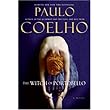The Witch of Portobello
Paulo Coelho
HarperCollins Publishers
The international best-selling author, Paulo Coelho, (The Alchemist, The Devil and Miss Prym) returns with another parable combining his trademark spirituality and religion. Athena, born of a gypsy woman and a gadje, a foreigner, in Transylvannia, and abandoned by her birth mother, adopted by a Lebanese Christian couple, and given the name Sherine Khalil, is dead, brutally murdered, when the novel begins. The narrative opens with a journalist who loved her, and hoped that she would love him, in turn, attempting to piece together the story of her life. In so doing, he depends upon not only his knowledge of Athena, but also the recollections and reminiscences of the various people who knew her well, or thought they did.
Pieced together from first person narratives of her adoptive mother, her teacher, her student, her ex-husband, her birth mother, and others, a picture emerges of Sherine Khalil, one that is still not very clear. Is she a young woman searching for the reason why she feels ‘different’, a seeker of the greater truth, a devotee of the Great Mother, a spiritual teacher, a founder of a new age cult, or is she a charlatan?
And so, Athena, gifted and restless, sets off on her personal journey to find answers to her life. She tracks down her birth mother in Transylvania, meets her soon-to-be-teacher on that same journey and intrigues a journalist who she runs into on that very same trip, so much so that he begins to obsess about winning her. Both character and author lightly brush aside the rather inconvenient fact that the former already has a girlfriend, who later becomes Athena’s student.
She is a reluctant teacher, at first, but as Athena learns about her power and how to channel it, she becomes one with the Mother Goddess, who she calls Hagia Sophia. Her prophetic powers lead to an increase in the number of her believers. As they flood her lectures in Portobello road, it brings her into direct confrontation with the pastor of the community. Reviled as a Satan worshipper, and shaken by the thought of her son being removed from her care, Athena decides to fight back. Only, she is murdered.
The first half of the book meanders between her as yet unawakened powers, and her rather unfocussed personal journey. While the many-points-of-view narrative is intriguing, the actual telling of the story is slow and disjointed. Half way through the rather confusing narrative, you begin to lose interest in Athena. The story picks up a little bit in the middle when Athena begins to understand her power and to overcome her reluctance to teach others, only to decline into an unsatisfactory ending that, though it is the proverbial twist in the tale, contradicts everything that Athena believed in.
It is a tempting premise - the spiritual journey to self-realisation, but it has been written about before, and with all due apologies to Coelho’s fans, has been written about much more subtly. Athena therefore becomes a cliché, and so does the world she is fighting. Somewhere, Coelho loses his grasp of his subject matter and pseudo-spiritual lessons on following your heart and accepting yourself for whom and what you truly are, is not enough to flog your lagging interest in the wafer-thin plot.
As in many of his earlier books, Coelho delves into faith and spirituality. Here, pagan traditions, and the rites and rituals of the cult of the Goddess make an appearance. It also depicts how fear of a new religion can lead to a modern version of the witch trials. Where Coelho fails, is in imbuing Sherine Khalil, Athena, or Hagia Sophia with enough depth to make us care what happens to her.
Copyright: Anuradha Warrier
www.domain-b.com 2008


No comments:
Post a Comment